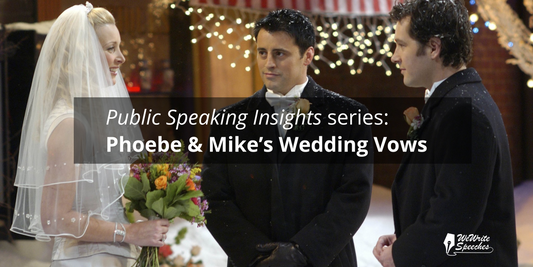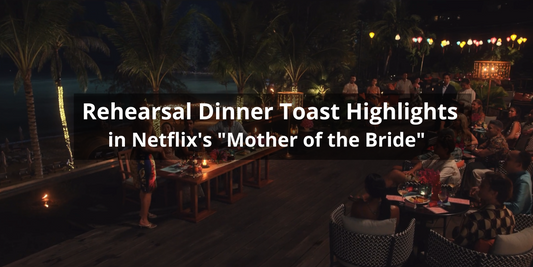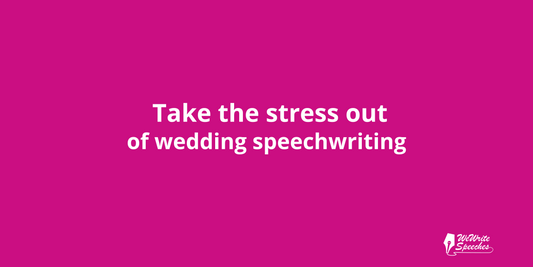Welcome to our exciting new blog series, "Wedding Speeches: Lessons from the Limelight". Here at WeWriteSpeeches, we're passionate about helping you create unforgettable moments through words. This series aims to explore the intricate art of wedding speeches by drawing inspiration from the world of performance arts. Whether you're a bride, groom, best man, maid of honor, or the proud parent ready to deliver your piece, there's something to learn from the realms of theater, improv, and stand-up comedy.
The Significance of Wedding Speeches
Wedding speeches are more than just a tradition; they're a deeply personal contribution to one of life's most cherished celebrations. These speeches can capture the essence of the bond between loved ones, offering laughter, joy, and sometimes a few happy tears. From the heartfelt "father of the bride speech" to the often humorous "best man speech," each oration contributes a unique thread to the tapestry of the day.
However, crafting the perfect speech can feel daunting. How do you balance humor and sentiment? What's the best way to engage your audience? That's where the art of performance comes in.
Learning from the Pros
In this series, we'll dive into three performance arts: theater, improv, and stand-up comedy, to uncover techniques that can transform your wedding speeches from good to unforgettable.
- Theater: The realm of the stage teaches us about storytelling, emotional delivery, and presence. From a well-crafted "groom’s speech" to the storytelling finesse required in a "mother of the bride speech," theatrical techniques can elevate your words, creating a profound connection with your audience.
- Improv: This art form is all about thinking on your feet, a skill invaluable to those unexpected moments during a wedding speech. Improv teaches us flexibility, spontaneity, and the art of turning surprises into memorable moments.
- Stand-Up Comedy: The key to a great "best man speech" or any speech with a hint of humor lies in the timing, delivery, and relatability found in stand-up comedy. Stand-up can teach us how to engage an audience, deliver punchlines, and weave humor seamlessly into our stories.
A Comparative Look
To kickstart our journey, let's take a quick comparative look at these forms of performance alongside wedding speeches:
| Criteria | Theater (Play) | Improv | Stand-Up Comedy | Wedding Speeches |
|---|---|---|---|---|
| Content Creation | Scripted by playwrights. Actors interpret the script but do not usually create content. | Content is created on-the-spot based on prompts or themes. | Created by the comedians themselves, often based on personal observations or experiences. | Created by the speaker, often based on personal experiences, anecdotes, and sentiments. |
| Preparation | Extensive rehearsal of scripted material. Involves memorizing lines, staging, and direction. | Minimal to no script. Performers practice techniques and games but create content spontaneously. | Scripted but allows for some improvisation. Comedians rehearse their set but may adjust on the fly. | Can range from fully scripted to loosely outlined. Each speaker prepares and rehearses in isolation, never seeing the other speeches until the event itself. |
| Foreknowledge of Other Performers' Lines | Complete, as all lines are scripted and known to all performers. | None, as content is created spontaneously. | Generally, not applicable. Stand-up sets are usually self-contained performances. | Very limited, Speakers typically don't know the specifics of what others will say, except what the couple tells them they should cover. |
| Interactions Between Performers | Direct and scripted, as actors play off each other according to the script. | High and spontaneous, performers build off each other's contributions in real-time. | Minimal, unless in a multi-comedian show where they might reference each other's sets or collaborate. | Indirect. Speeches may reference or respond to previous speakers without real-time interaction. |
| Interaction with audience | Audience interaction is minimal, typically limited to reactions that performers feed off of. | High level of audience interaction. Suggestions often shape the performance. | High, performers often engage directly with the audience, using reactions to adjust their act. | Moderate, involves directly addressing the newlyweds or other groups within the audience. |
| Performance Style | Character-driven, with emphasis on narrative and emotional depth. | Character and narrative are improvised, with a focus on humor and quick thinking. | Solo performances focusing on humor through storytelling, jokes, and observations. | Personal and emotional, aiming to honor, amuse, and sometimes advise the couple and guests. |
| Audience Expectation | Engagement with a story or dramatic narrative. | Expectation of spontaneous, interactive humor. | Laughter and entertainment through jokes. | Emotional resonance and personal connection, often expecting humor, sincerity, and heartfelt messages. |
| Flexibility | Limited. Performances follow a predetermined script and direction. | Very high. Performers must adapt quickly to new ideas and audience suggestions. | Moderate to high. Comedians may adapt based on audience reaction or incorporate spontaneous remarks. | Moderate. Speakers may adapt based on the setting and audience reactions but will stick to a planned structure. |
| Duration | Typically longer, from one to several hours. | Varies, but usually shorter than plays, ranging from a few minutes to an hour. | Varies, but sets are generally shorter, from a quick five-minute set to an hour-long special. | Short, usually ranging from a few minutes to 10-15 minutes, depending on the speaker and the context of the wedding event. |
In the coming posts, we'll delve deeper into each of these areas, providing you with actionable tips and insights to harness the power of performance in your wedding speeches. Whether you're utilizing WeWriteSpeeches' advanced LLM technology or our innovative speech planning tool, understanding these performance principles will surely enhance your speechwriting journey.
Stay tuned for our next post, where we'll explore how theatrical techniques can be applied to crafting mesmerizing wedding speeches.




